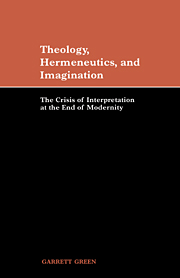Book contents
- Frontmatter
- Contents
- Preface
- 1 Theological hermeneutics in the twilight of modernity
- Part I The modern roots of suspicion
- Part II Christian imagination in a postmodern world
- 6 The hermeneutics of difference: suspicion in postmodern guise
- 7 The hermeneutic imperative: interpretation and the theological task
- 8 The faithful imagination: suspicion and trust in a postmodern world
- Appendix: Hamann's letter to Kraus
- Bibliography
- Index
6 - The hermeneutics of difference: suspicion in postmodern guise
Published online by Cambridge University Press: 22 September 2009
- Frontmatter
- Contents
- Preface
- 1 Theological hermeneutics in the twilight of modernity
- Part I The modern roots of suspicion
- Part II Christian imagination in a postmodern world
- 6 The hermeneutics of difference: suspicion in postmodern guise
- 7 The hermeneutic imperative: interpretation and the theological task
- 8 The faithful imagination: suspicion and trust in a postmodern world
- Appendix: Hamann's letter to Kraus
- Bibliography
- Index
Summary
The Word became flesh: that is the first, original, and governing sign of all signs.
BarthWe have this treasure in earthen vessels, to show that the transcendent power belongs to God and not to us.
2 Corinthians 4.7So far we have followed the course of the hermeneutics of suspicion from its prehistory in the modern accommodationist theology first exemplified in Kant's Religion within the Limits of Reason Alone, through its founding by Feuerbach, and its flowering in the “masters of suspicion,” Marx, Freud, and Nietzsche. The previous chapter focused on what might be called the modernist Nietzsche, who attacks Christian faith and morality in the name of nature, reality, and health. Despite great differences among the classic nineteenth-century varieties of suspicion, they can all be classified as variations on the theme of “false consciousness.” As we have noted, however, the case of Nietzsche is different – more complicated but also more interesting – because he stands as a kind of Janus figure at the threshold of postmodernity. His voice has come to be heard today, in the twilight of modernity, not as the radical Aufklärer denouncing the Christian fiction, but rather as one who declares that “there are no facts, only interpretations.” Whether the two Nietzsches can be reconciled is an interesting question in its own right but not one that will concern us here.
- Type
- Chapter
- Information
- Theology, Hermeneutics, and ImaginationThe Crisis of Interpretation at the End of Modernity, pp. 143 - 166Publisher: Cambridge University PressPrint publication year: 1999

